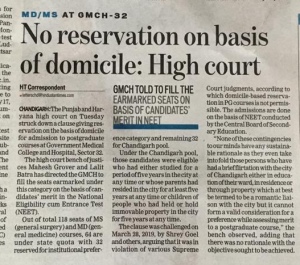Domicile Reservation for admissions in Colleges: Boon or Bane?
Many states had started implementing the domicile reservation policy following which the Rajasthan state government has also proposed to extend domicile reservation in National Law University, Jodhpur. An amendment bill was passed by the legislative assembly which provided for reserving 50% of seats in National Law School of India University, Bangalore for the residents of Karnataka was passed. Similarly, the Delhi Assembly also passed a resolution providing for reserving 85% seats in the colleges that are affiliated to Delhi University.
The domicile reservation plays an important role in admissions to medical colleges. Therules in National Eligibility cum Entrance Test (NEET) mentions that the respective state government can reserve maximum upto 85% of the seats for the students domiciled in the particular state which leaves only15% for all India students.
The Supreme Court of India has said that it is essential for the state governments to place the regional studentsfirst. The decision regarding it was first pronounced by a three-judge bench in the case of Dr.Pradeep Jain v. Union of India in the year 1984. In this case, the court provided two broad justifications for the domicile reservation which can be classified into financial assistance by the state and backwardness of a particular region.
But the major issue is there are states that have many educational institutions which provideeducation to the students in diverse fields whereas there are some regions which havea dearth of significant institutions. Due to this, students have to flee to other regions to seek admissions in better institutions. If all the institutions in the States adopt the policies of domicile reservation, which is the present day scenario, then it will restrictthe students from other states to get an education in metropolitan areas for better academic opportunities.
It is necessary to highlight in the foregoing discussion that the basic objective of domicile reservation should be justified with other factors. The policymakers must look at its national impact of depriving opportunity to backward states of the country. These kinds of steps should not compromise with the diversity of the students in the institutions of national importance which are the pertinent factors which require consideration.
Therefore, policymakers are required to involve in the discussion to consider the merits and demerits of the domicile based reservation and rethink about the current process to provide better solutions to the issues. Similarly, a recent judgment has been given by the Panjab and Haryana High Court on the related matter.

Facts of the Case
No reservation on the basis of domicile: High Court
- The Punjab and Haryana High Court on Tuesday struck down the clause giving reservation on the basis of domicile for admission to postgraduate courses at Government Medical College and Hospital, Sector 32.
- The high court bench of justices Mahesh Grover and LalitBatra has directed the GMCH to fill the seats earmarked under this category on the basis of candidates’ merit in the National Eligibility cum Entrance Test (NEET).
- Out of total 118 seats of MS (general surgery) and MD
(general medicine) courses. 64 are under state quota with 32 reserved for institutional preference category and remaining 32 for Chandigarh pool. - Under the Chandigarh pool, those candidates were eligible who had either studied for a period of five years in the city at any time or whose parents had resided in the city for at least five years at any time.
- The clause was challenged on March 28, 2019, by ShreyGoel and others, arguing that it was in violation of various Supreme Court judgments, according to which domicile based reservation in PG courses is not permissible.
- The admissions are done on the basis of NEET conducted by the Central Board of Secondary Education.
- “None of these contingencies to our minds have any sustainable rationale as they even take into fold those persons who have had a brief flirtation with the city of Chandigarh either in education of their ward, in residence of through property which at best be termed to be a romantic liaison with the city but it cannot form a valid consideration for a preference while assessing the merit to a postgraduate course,” the bench observed, adding that there was no rationale with the objective sought to be achieved.
This post is written by Damini Aggarwal (PU). For more info on subject, please dial 99888-17966.